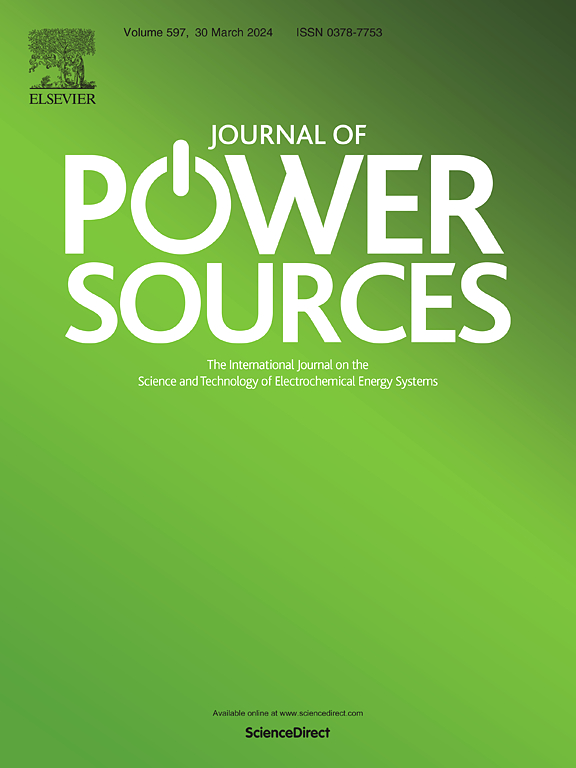锂离子电池多级恒流快速充电的健康状态评估
IF 7.9
2区 工程技术
Q1 CHEMISTRY, PHYSICAL
引用次数: 0
摘要
在锂离子电池(LIBs)应用中,快速充电技术的广泛使用极大地提高了用户的便利性。然而,不同的快速充电策略会显著影响电池的健康状态(SOH)。特别是在多级恒流快速充电条件下,锂离子电池SOH的准确估计面临着泛化能力差、计算成本高等问题。针对这些问题,本研究提出了一种适用于多级恒流快速充电场景的电池健康特征,该特征通过充电电压数据提取,操作简单,相关性强,且不受后期评价中截止电压变化的影响。结合自监督学习方法,本研究仅利用少量标记数据就能准确估计lib的SOH,同时显著降低了计算成本。在两个公开的大型快速充电数据集上进行了验证,结果表明,在多段恒流快速充电条件下,LIBs的SOH估计的均方根误差(RMSE)和平均绝对误差(MAE)在0.5%以内,决定系数(R2)在0.9950以上,在显著节省计算成本的同时提高了模型的泛化能力。本文章由计算机程序翻译,如有差异,请以英文原文为准。
State of Health estimation of lithium-ion batteries under multistage constant current fast charging
In lithium-ion batteries (LIBs) applications, the widespread use of fast charging technology has dramatically enhanced user convenience. However, different fast charging strategies significantly impact batteries' State of Health (SOH). In particular, under multistage constant current fast charging conditions, accurate estimation of SOH of LIBs faces problems such as poor generalization ability and high computational cost. To solve these problems, this study proposes a battery health feature applicable to multistage constant current fast charging scenarios, which is extracted by charging voltage data, is easy to operate and relevant, and is not affected by the change of cut-off voltage in the later evaluation. Combined with a self-supervised learning approach, this study can accurately estimate the SOH of LIBs by utilizing only a tiny amount of labeling data while significantly reducing the computational cost. The proposed method is validated on two large publicly available fast charging datasets, and the results show that the Root Mean Square Error (RMSE) and Mean Absolute Error (MAE) of SOH estimation for LIBs under multistage constant current fast charging are within 0.5 %, and the coefficient of determination (R2) is above 0.9950, which significantly saves computational cost while improving the model generalization capability.
求助全文
通过发布文献求助,成功后即可免费获取论文全文。
去求助
来源期刊

Journal of Power Sources
工程技术-电化学
CiteScore
16.40
自引率
6.50%
发文量
1249
审稿时长
36 days
期刊介绍:
The Journal of Power Sources is a publication catering to researchers and technologists interested in various aspects of the science, technology, and applications of electrochemical power sources. It covers original research and reviews on primary and secondary batteries, fuel cells, supercapacitors, and photo-electrochemical cells.
Topics considered include the research, development and applications of nanomaterials and novel componentry for these devices. Examples of applications of these electrochemical power sources include:
• Portable electronics
• Electric and Hybrid Electric Vehicles
• Uninterruptible Power Supply (UPS) systems
• Storage of renewable energy
• Satellites and deep space probes
• Boats and ships, drones and aircrafts
• Wearable energy storage systems
 求助内容:
求助内容: 应助结果提醒方式:
应助结果提醒方式:


